There is just something about the ‘cloud’. Cloud computing, also known as the ‘cloud’, has gained momentum over the years as more businesses are taking advantage of what it has to offer. Instead of traditional methods, cloud computing uses a network of remote servers to store, manage and process data, all on the Internet.
Are you interested to learn myths of cloud computing from experts? Intellipaat provides the best Azure, DevOps and AWS training taught by industry experts.

Since it is so hyped up, naturally there have been a few myths flying around. But it is time so set those straight.
Myth #1: Everything works better in the cloud
Yes, there are definitely some great advantages of cloud computing, streamlined processes included. Though some business practices can work more efficiently and effectively via the cloud, this does not mean that every aspect of business does. It is a matter of balance, between different types of cloud offerings and infrastructure. For example, the public cloud may be a better option for one business task and the private cloud may be the better option for another. Some applications, on the other hand, may just simply run more smoothly and comfortably for the user on a dedicated server, as they were created to. In this case, a combination of the cloud and a traditional infrastructure can be compiled so that maximum efficiency is reached via a hybrid solution.
SEE ALSO: 12 Excellent Cloud-Based Tools To Be Productive
Myth #2: Everything is cheaper in the cloud
Costs for using the cloud depends on the type you are interested in and how much computing power you are looking to get. A public cloud is cheaper than a private cloud, but that does not mean that a public cloud is always cheaper than traditional server options. Cost efficiency can be maximized through the cloud by switching off servers during periods of lower demand, but costs can still add up. There are many benefits of the cloud, and though it can be cost-efficient, it does not always mean that everything is cheaper in the cloud.

Co-founder and CEO of Stackpop, Jason Evans, says that although “cloud is rapidly evolving (dedicated ‘cloud’ servers, guaranteed IOPS, cheaper pricing, etc.) for the most part – today – cloud economics across any cloud provider does not make sense for larger-scale applications. For companies with any type of scale whatsoever (around $15 – $20K per month from a consistent baseline traffic load), it is significantly cheaper to move the baseline load to your own, collocated environment.”
Myth #3: The cloud costs jobs.
This is certainly a myth, as in fact, the cloud does just the opposite: it creates jobs. As the cloud becomes more popular, more cloud professionals are needed and more job opportunities are available. From there, other companies spin off, grow and develop to create an even greater cloud community. Cloud-savvy experts will continue to be in demand and professionals will be required for cloud companies in general.
Not only has the cloud created jobs, but it has also inspired various learning platforms to pop up on the internet – dedicated to teaching cloud computing. The courses offered do not only touch upon the basics but also how to handle specific platforms such as AWS and Microsoft Azure. If you would like to become AWS certified solutions architect, for example, there are various learning paths available online.
These are just three existing myths about cloud computing. With so many options out there in the technology space, it is important that we have realistic expectations and take into consideration all aspects of the cloud. From there, it is all just about finding the right fit.
You can also stay updated by subscribing to iTechCode.